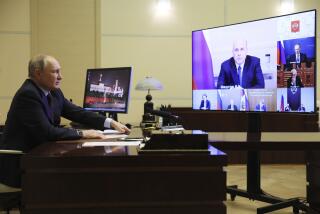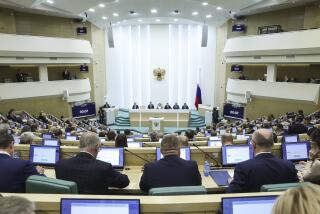Soviets Extend A-Test Ban--as Long as U.S. Refrains : But Reagan Sees Need to Continue
- Share via
MOSCOW — Soviet leader Mikhail S. Gorbachev today extended the Soviet ban on nuclear tests at least until the United States conducts another atomic test of its own.
The White House, however, said its position was unchanged and that further testing by the United States would be “necessary . . . in the near future.”
Gorbachev, who had already extended the unilateral test ban until the end of this month, announced the decision in his reply to a message from the leaders of Argentina, India, Mexico, Tanzania, Sweden and Greece.
“The Soviet Union shall not conduct nuclear explosions after March 31 either--until the U.S.A. carries out its first nuclear explosion,” he said.
Begun Last August
Gorbachev initially introduced the moratorium last August on the anniversary of the United States’ atomic blast of Hiroshima in World War II. He extended the ban for another 90 days on Jan. 1.
The Soviet leader, asked by the six leaders to extend the moratorium at least until the next summit with President Reagan, again urged the United States to declare a similar ban as a step toward eliminating nuclear weapons.
In Washington, however, White House spokesman Larry Speakes said the U.S. position on nuclear testing “has not changed. Nuclear weapons remain for the foreseeable future an essential element of our deterrent force.”
Speakes said the United States is studying the letter from the six nonaligned nations, noting that they recognize the need for verification.
Soviet Gains Cited
But, he said, the Soviets have made “rapid gains” in nuclear weapons “and it’s necessary for us to conduct tests and our allies to conduct tests in the near future.”
Gorbachev, in his message, said the Soviet Union could not extend its ban on testing “in perpetuity” if the United States did not reciprocate. “The extra time we granted the American Administration to weigh our proposals is running out,” he said.
Gorbachev restated his offer to allow on-site verification of a test ban.
“As regards a nuclear test ban, verification can be ensured by national technical means and also with the help of international procedures--including on-site inspections if need be,” the statement said.
Site Visits Possible
Tass, the Soviet press agency, quoted Gorbachev as offering to discuss “possibilities for observers from both sides to visit sites where unclear phenomena occur . . . to remove possible doubts as to whether such phenomena are related to nuclear explosions.”
The United States has rejected Soviet proposals on verification of a test-ban agreement, insisting that checks should take place on a regular and reciprocal basis and not just after one side becomes suspicious that the other has violated the agreement.
U.S. officials also say they should have the opportunity to calibrate measuring instruments according to the geological conditions of Soviet nuclear test sites.
In an interview with the Baltimore Sun on Wednesday, Reagan said a recent House vote calling for test-ban negotiations undercuts American efforts to achieve an overall arms-control accord.
He also said, “We are willing to meet them on that (a nuclear test ban), but we can’t get a satisfactory answer yet on real verification.”
In addition, he said “it wouldn’t be fair” for the United States to be required to stop testing “until we’ve made the same tests comparatively . . . that they have made with their new and improved modernized weapons.”
More to Read
Sign up for Essential California
The most important California stories and recommendations in your inbox every morning.
You may occasionally receive promotional content from the Los Angeles Times.













